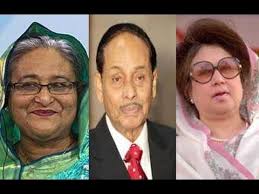Yahoo Image Search Result
Search Results
Bangladesh Awami League
Main article: Bangladesh Awami League
The Bangladesh Awami League (Bengali: বাংলাদেশ আওয়ামী লীগ; translated from Urdu: Bangladesh People's League) is one of the two largest political parties of Bangladesh. It is the country's current governing party, after winning a majority in heavily criticized 2014 parliamentary elections where the majority of seats were uncontested.[5] The All Pakistan Awami Muslim League was founded in Dhaka, the capital of the Pakistani province of East Bengal, in 1949 by Bengali nationalists Maulana Abdul Hamid Khan Bhashani, Yar Mohammad Khan, Shamsul Huq, and later Huseyn Shaheed Suhrawardy. In 1953, the party's council meeting voted to drop the word "Muslim" from its name in order to give it a more secular outlook, owing to the need to include the province's large Hindu population in Pakistani politics. Amongst the leaders of the Awami League, five have become the President of Bangladesh, four have become the Prime Minister of Bangladesh and one became the Prime Minister of Pakistan. His daughter and also the incumbent Prime Minister of Bangladesh, Sheikh Hasina, has headed the party since 1981.
Bangladesh Nationalist Party
Main article: Bangladesh Nationalist PartyThe Bangladesh Nationalist Party (Bengali: বাংলাদেশ জাতীয়তাবাদী দল, transliterated: Bangladesh Jatiotabadi Dôl), often abbreviated as BNP was founded on 1 September 1978 by Bangladeshi President Ziaur Rahman, politician and physician A. Q. M. Badruddoza Chowdhury, human rights activist and lawyer Moudud Ahmed and leftist politician Mashiur Rahman as the key people. BNP has won the second, fifth, sixth and eighth national elections and two presidential elections, in 1978 and 1981 respectively. The party also holds the record of being the largest opposition in the history of parliamentary elections of the country with 116 seats in the seventh national election of 1996.[6] The party does not have any representation in the parliament after its boycott of the national election of 2014 which the party had termed a scandalous farce and was marked by a very low turnout.[7]
Jatiya Party (Ershad)
Main article: Jatiya Party (Ershad)
The Jatiya Party (Ershad) (National Party (Ershad)) was established by President Hussain Mohammad Ershad on 1 January 1986. The Army Chief Lieutenant General Hussain Muhammad Ershad had usurped the state power by a coup d'état on 24 March 1982, and ruled the country as chief martial law administrator till December 1983. Political parties and activity had been prohibited during the state of emergency, when Justice A. F. M. Ahsanuddin Chowdhury was appointed President of Bangladesh.
The Jatiya Party had a rift in leadership and an internal wrangle in 2000. The three factions were headed by General Ershad, Anwar Hossain Manju and Naziur Rahman Manju. In the general elections of 2001, the Ershad group of the Jatiya Party won 14 seats, and the Anwar Hossain group won one seat.
Minor parties
These are the minor parties are registered at the Bangladesh Election Commission[8]
- Liberal Democratic Party (Bangladesh)
- Jatiya Party (Manju)
- Communist Party of Bangladesh (Marxist–Leninist) (Barua)
- Krishak Sramik Janata League
- Communist Party of Bangladesh
- National Awami Party
- Workers Party of Bangladesh
- Bikalpa Dhara Bangladesh
- Jatiya Samajtantrik Dal
- Jatiya Samajtantrik Dal-JSD
- Bangladesh Jatiya Party – BJP
- Bangladesh Khilafat Andolan
- Gano Forum
- Progressive Democratic Party (Bangladesh)
- Bangladesh Jatiya Party
- Islamic Front Bangladesh
- Islami Oikya Jote
- Bangladesh Khelafat Majlish
- Islami Andolan Bangladesh
- Bangladesh Islamic Front
Regional parties
- Parbatya Chattagram Jana Sanghati Samiti
- United People's Democratic Front


































No comments:
Post a Comment